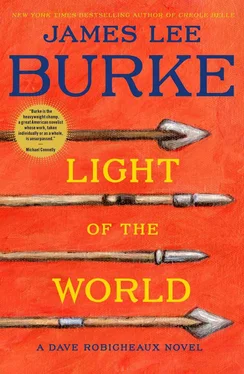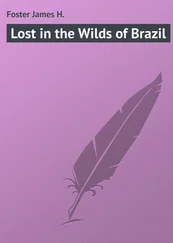Up on the highway, a pair of headlights came over the rise and descended the grade, the high beams tunneling through the darkness between the orchards and the slope of the mountain. Caspian was disconcerted for only a moment. “No matter what else happens, there is one man who will not leave this property. That man is Asa Surrette,” he said. “The men who take him out will divide a twenty-thousand-dollar credit line in Las Vegas. I want him blown apart. Does everyone understand?”
The wind dropped and the night was still. A pickup truck on the highway was slowing as it came down the grade, as though the driver were looking for a turnoff. The pickup passed under a light pole that had been left on over a cherry stand. The truck was painted metallic orange; a camper shell was snugged into the bed.
“One other thing,” Caspian said. “There’s a fat guy out here named Purcel. He’s a disgraced cop from New Orleans who abused my wife. I want him alive. You can put some holes in him, but he doesn’t do the big exit before I have a chat with him. Are there any questions?”
“What if some IPs go down?” one man asked.
“Innocent persons?” Caspian said. “There are no innocent persons. That’s why people get baptized. You didn’t know that? You break eggs to make an omelet. One baby dies, another lives. A whole society is destroyed when one of us steps on an anthill. A hundred thousand die to control the benchmark price on a barrel of oil. That’s how the world operates. We didn’t make the rules. Any other questions?”
He was smiling. I wondered what Clete was thinking. I also wondered how an execrable creature like Caspian Younger, whose sneer and arrogance were like none I had ever seen, could be given the power to make decisions about the life and death of other people.
“All right, start your sweep,” he said. “If in doubt, take it out.”
“That truck up on the highway?” one man said.
“What about it?” Caspian asked.
“It just stopped and turned around.”
Clete purcel’s night vision was not of an ordinary kind. He did not see the external world more clearly than anyone else during the nocturnal hours, nor did he see it with any less clarity; he simply saw it in a different fashion. After his return from Southeast Asia, he realized that a fundamental change had taken place inside his neurological makeup. The change was not one he understood, at least not until he read an article in a town-and-country magazine about the way horses see the world. According to the article, horses have two visual screens in their heads and watch both simultaneously.
Unlike the horse, Clete did not have two screens in his head; he had two transmitters, and they contended for space on a single screen. Any number of triggers could send him back in time and click on a live feed from the years 1966 to 1968 and force him to watch scenes from a horror show that never had a good ending.
He had not moved or even raised his eyelids while Caspian addressed his men. Inside his head, he saw a valley swirling with elephant grass that was never green but always gray or yellow or brown, as though the land had been systemically poisoned and could not follow the dictates of the season. At the far end of the valley were hills that had the softly contoured shape of a woman’s breasts, and in order to reach them, he had to follow the banks of a muddy stream coated with mosquitoes and strung with the feces of water buffalo. The only sounds in the valley were the sucking noises of his boots in the mud and the thropping of helicopters in a sky the color of brass. Even though Clete was now crouched inside a fruit orchard on an alpine lake, he could smell the jungle rot in his feet and the body stink in his utilities and feel sweat running down his sides like lines of black ants.
“A couple of you guys check out that truck and tell the guy to mind his own business,” Clete heard Caspian say.
“I’ve seen that truck,” one man said. “You know who that is?”
“No, I don’t,” Caspian said. “That’s why I told you to check him out.”
“He’s a shitkicker,” the same man said. “You know, what’s-his-name.”
“Have I hired a bunch of morons?” Caspian said.
“We’re on it, Mr. Younger,” another man said.
“The guy has a squirrel cage for a brain,” the first man said. “I can’t remember his name.”
“Then be quiet and go find out who he is.”
Three rockets zipped from an island in the lake and popped overhead in a shower of blue and pink and white foam, lighting the orchard like a pistol flare.
“Behind you, Mr. Younger,” one of Caspian’s men said, pointing at the cherry trees.
That was when they all cut loose.
They had seen Clete but not me. At least six or seven were firing in his direction, the bullets ripping through the trees, cutting branches and raining black cherries on the ground. I was still on one knee. I raised the M-1 to my shoulder and aimed through the peep sight and began shooting. I had never fired an M-1 at a human target. The first man I hit was running for the edge of the shed, trying to position himself so he could choose his shots as his compatriots took the brunt of our fire. I saw red flowers bloom on the back of his shirt while his body jacked forward and struck the shed wall.
Another man had set up behind the fender of the Chrysler and was firing a semi-auto that had a suppressor and an extended magazine, not aiming and probably not counting rounds. Each shot sounded like compressed air released from a bottle of carbonated water. Because the suppressor lowered the bullet’s velocity, the rounds that went past my ear made a whirring sound, like a boomerang whipping through the air. My first shot hit the headlight and blew glass into his face. The second whanged off the top of the fender and hit the shed wall. The third went home and knocked him loose from the car and onto the ground, where he remained with his feet pulled up in a fetal position.
The bolt locked open on an empty chamber, and I heard the tinny sound of the clip ejecting. I pushed another into the breech and released the bolt and began firing again, the stock recoiling solidly into my shoulder with each shot. I saw Clete Purcel coming toward me, bent low, holding his hip, as though he had walked into the sharp corner of a tabletop. His face was pale, his eyes bigger than they should have been. He sank down next to me. I gathered up the sling of his rifle and slung it on my shoulder. “How bad are you hurt?” I said.
“I think it went on through. Maybe it clipped a bone,” he said. A bloodstain was spreading through his shirt. “More of them are headed our way.”
“No, there were only eight or nine besides Younger. I got at least two of them.”
“I saw them coming down the slope. I didn’t imagine it.”
I shook my head. “That’s not possible,” I replied. “There’s nobody else up that slope. Keep it simple, Cletus. Younger is an amateur, and so are the guys who work for him. He’s down to a few men.”
“I know what I saw.” He took his .38 from his holster. “Get going. I’ll slow them up.”
“That’s not going to happen, Clete. Get up.”
“I’m too dizzy. That son of a bitch really whacked me.”
I got to my feet and pulled him up with me, working his big arm over my shoulder. “You’re going with me, or we’re going out together. If we can make it to the driveway, we’ll spray the orchard and have Gretchen and Alf on their flanks. We’ll cut them to pieces.”
His eyes closed and opened again, as though he were unsure where he was. “Let’s rock,” he said.
We moved through the trees, the cherries hitting our faces, the tree branches like whips against our skin. Then I heard the report of a rifle from the yard of the stone house and heard a bullet zip through the trees and smack against the shed, followed by a second and a third shot, and I realized Gretchen was putting down covering fire for us with the bolt-action Mauser she carried in her pickup. “See?” I said. “We’re going to make it. Just put one foot after another. It’s easy. Like Rudyard Kipling said about going up Khyber Pass, you do it one bloody foot at a time.”
Читать дальше












